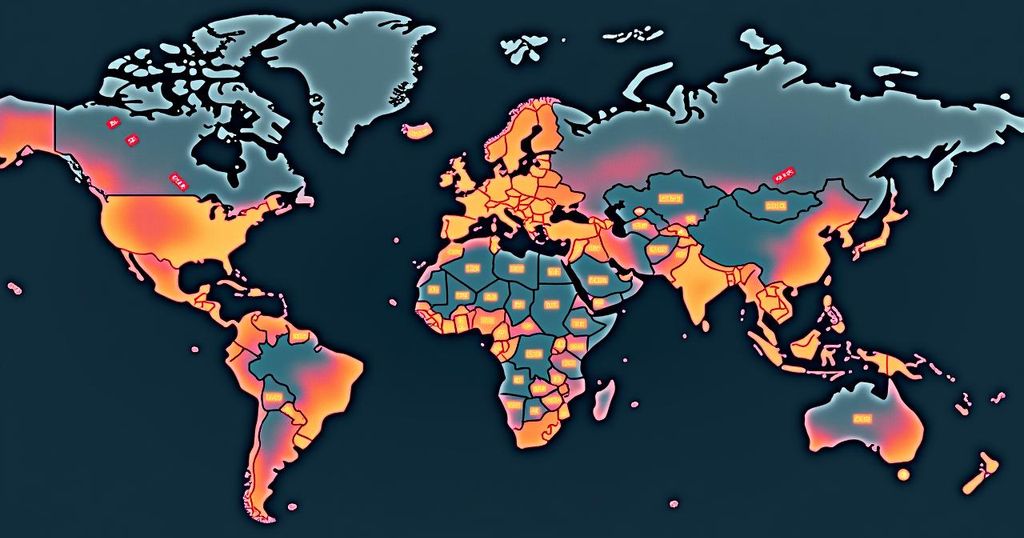International Spread of Mpox: Countries Reporting Cases and Health Implications
The mpox virus, which initially spread in East Africa, is now identified in multiple countries including Sweden, Thailand, Philippines, and Pakistan. The WHO has declared a public health emergency due to the more serious Clade 1 variant, predominantly affecting the DRC. Health authorities urge global vigilance as the virus threatens to scale up, especially with reported cases emerging beyond Africa.
The recent emergence of the mpox virus has raised global health concerns, with new and potentially more lethal strains reported across several continents. After initially identifying cases in East Africa, the virus is now confirmed in various countries beyond the continent. Notably, Sweden, Thailand, the Philippines, and Pakistan have reported mpox cases, highlighting a far-reaching spread of the virus. International health authorities, including the World Health Organization (WHO), have escalated their alerts, deeming the situation a “public health emergency of international concern.” This is the second emergency alert concerning mpox issued by the WHO in two years. Current outbreaks have been primarily associated with Clade 1, a more severe variant of the mpox virus, known to spread through direct skin contact. Clade 1 has been circulating in African nations since 2022, with the Democratic Republic of the Congo (DRC) being the epicenter of the outbreak. This year, a new strain called Clade 1b was identified in the DRC, while Clade 2, although less severe, is also present, contributing to the ongoing crisis. Across Africa, reports indicate a staggering number of cases, mostly occurring in the DRC, where a significant portion of infections are among children under 15. As of August, the Clade 1 variant and its subvariant Clade 1b have also been detected in three countries neighboring the DRC. In Asia, recent cases in Thailand and the Philippines demonstrate the virus’s expanding reach, with Thailand confirming its first case of the Clade 1b variant in a traveler returning from Africa. In Europe, Sweden has recorded a case of the more serious Clade 1 variant, prompting health officials to anticipate further cases due to frequent travel between Europe and Africa. While regions such as the Americas and Oceania currently lack confirmed cases of Clade 1 mpox, health organizations are urging vigilance against potential outbreaks of both Clade 1 and Clade 2 variants. This proliferation of mpox underscores the importance of prompt diagnosis, effective surveillance, and comprehensive contact tracing measures to contain its spread and mitigate public health impacts.
The mpox virus, formerly referred to as monkeypox, has emerged as a significant global health concern in recent years. Originating in the DRC, the virus has demonstrated a substantial ability to spread, especially through skin-to-skin contact. The disease is categorized into different genetic clades, with Clade 1 being the more severe variant leading to increased mortality compared to Clade 2, which is known for milder symptoms. The ongoing outbreaks have prompted public health officials worldwide to enhance surveillance and preventive measures as cases proliferate beyond Africa into various regions, including Asia and Europe. The WHO’s declaration of a public health emergency signalizes the need for coordinated international efforts to address this health threat effectively.
The ongoing mpox outbreak, particularly the emergence of Clade 1 and its variant Clade 1b, exemplifies an urgent global health challenge. With cases now documented in multiple countries across Africa, Asia, and Europe, it is imperative that health authorities remain vigilant. Maintaining high levels of surveillance, rapid diagnosis, and effective contact tracing will be critical in curbing the spread of the virus and protecting public health. The WHO’s alerts underscore the gravity of the situation and necessitate a unified international response to manage the outbreak effectively.
Original Source: www.aljazeera.com




Post Comment